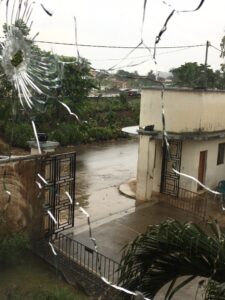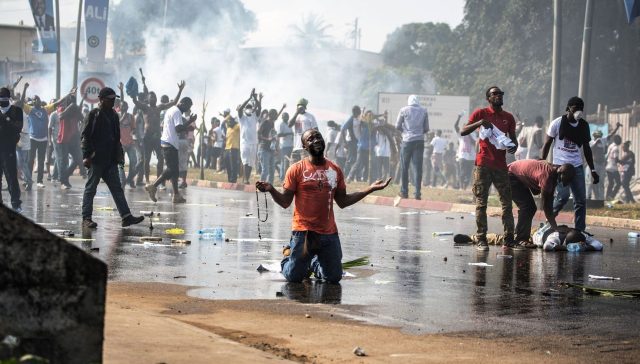A supporter of Jean Ping prays in front of security forces in August 2016 (MARCO LONGARI/AFP via Getty Images)

The taxi pulled up outside an unremarkable concrete block. It wasn’t quite what I’d been expecting but I paid and got out. An election banner drooped from a second-floor balcony. Maybe this was the right place.
It was January 2017, and I was looking for the residence of Jean Ping, the leader of the Gabonese opposition, who was holding his first press conference in months. I was hoping to get him talking about how the Africa Cup of Nations, the football tournament I was in Gabon to cover, was another example of the Bongo regime wasting the country’s resources. But this didn’t look like somewhere a politician would live.
There was no one around, so I wandered in. It was empty. There were broken windows, torn posters, a ripped armchair. I went up to the first floor. The doors hung open, locks smashed. I went into an empty room. There was a circular hole in the window, cracks radiating outwards. The grubby cream walls were streaked with deep brownish red smears and handprints, the marks of fingers. I think I knew then what I was looking at, but it was only later that I processed it. I’m a football journalist. I was well aware I was out of my depth.
An elderly man in overalls emerged and asked what I was doing. It turned out the taxi had brought me to Ping’s campaign headquarters, rather than his residence. The caretaker pointed me in the right direction and, a few minutes later, I was drinking coffee with Ping in his villa. But by then I knew what I’d seen. A return to the campaign headquarters with two colleagues confirmed what I had suspected. The outer walls were dimpled with bullet holes. The windows of the gatehouse were shattered. Some attempts had been made to clear up, but there was plenty of evidence of blood.
Yesterday, Gabonese military officers appeared on television to announce they had seized power following disputed election results, ending the 56-year rule of the Bongo family. What I had stumbled upon six years ago was the aftermath of the previous election, held in August 2016.

Omar Bongo became president after the death of Léon M’Ba in 1967, and eagerly continued his predecessor’s work in dismantling the nascent post-independence democracy. He remained in power until his own death, in 2009. When his son, Ali, won the subsequent election, there was protracted political violence for the first time in the country since 1964, when French paratroopers had put down an attempted military coup provoked by M’Ba’s dissolution of the national assembly. In 2009, a three-month curfew was imposed on Port Gentil, a centre of anti-Bongo feeling. What followed the election in 2016 was far worse.
Initial results from the ballot suggested Ping, a former minister for Omar Bongo who had married Ali’s half-sister, Pascaline, had won in seven of Gabon’s nine provinces. As the Gabonese National Electoral Commission (Cenap) delayed announcing a result, the opposition became convinced the election was being fixed. The EU’s chief observer Mariya Gabriel later spoke of “significant weaknesses in the electoral process”.
After four days, on August 31, opposition supporters gathered at Ping’s campaign headquarters to march on Cenap and demand a result. The Assemblée Nationale was set on fire. When tear gas failed to disperse the crowds, the security forces turned to live ammunition.
One of the demonstrators was Sylvie Mbot, the head of the doctors union. “While we were marching, we heard that Bongo had won,” she said. “That’s why we were angry. We said that wasn’t possible. But there were police already on the street. They had real weapons — Kalashnikovs and tear gas. They fired the tear gas and then shot at the crowd. People were really angry. They wanted to overthrow the lorries and started pushing at one. The policemen took guns and shot directly at a man I recognised. They hit him in the thigh.
“At about 4pm we took the injured to hospital with the Red Cross. I went back to the HQ at about 7pm. On the second floor they’d collected all the injured people. There was blood everywhere and very few doctors to look after these people.” The Red Cross helped to transport the most seriously injured to hospital. Mbot went with them.
Sometime between midnight and 1 in the morning, soldiers dressed in black approached the front of the campaign headquarters. In a pile of rubbish by the front gate, we found a helmet, with a leather flap at the back to protect the neck. Some say they were mercenaries, others that they were members of the elite presidential guard. First, they fired tear gas; then, when Ping’s supporters threw stones, they opened fire with plastic bullets.
Christophe* was hit in the calf but managed to crawl up to the fourth floor. As other demonstrators fled over the back wall or into the Equatoguinean embassy next door, the soldiers switched to live ammunition. “They came to kill,” said Christophe.
Cars were parked along the driveway to the left of the building. “Those who couldn’t get over the wall went under the cars,” said Franck*. “They shot under the cars — young people, old fathers, old mothers… I was on the top floor and could see down. I tried to bring people inside but unfortunately they had already fired tear gas into the lobby.” We found blood-stained fragments of glass in the cracks between the paving stones that seemed to corroborate the story.
Some fled to the roof, but two helicopters were circling. In the building, the lights were turned off to conceal those inside. Christophe lay on the floor, keeping below the level of the windows. He could hear the police working along the line of cars, picking off their victims. “I could hear their cries,” he said. All night this was happening. I could hear people crying: ‘Please don’t kill me! I’m Gabonese! I won’t demonstrate any more.’ Then they went quiet. We guessed they were killed. That went on until 5am.”
What happened to the bodies is unclear. A few days later, we met a disaffected former government advisor called Serge whose nephew and uncle had both gone missing that night. After a week, he finally tracked down the bodies to one of the city’s four morgues and paid for an autopsy. His nephew’s death certificate is quite clear: he had been shot twice in the leg but had died as a result of “wounds caused by the penetration of small-calibre bullets at the forehead”. His uncle had also been shot in the head.
At around 5am, police broke into the building. “They told us to kneel down, take our shirts off and put our hands on our heads,” said Christophe. “They told us one by one to get into the cars to drive to the police station. They made sure there was nobody left.” Franck believes there were around 1,500 Ping supporters in the building at the time. He got away because he knew one of the policemen.
The injured, Christophe included, were taken to hospital. He was lucky, and escaped. “I got my brother to come and get me,” he said. “I told the doctor I was just going outside for a moment to give my brother a key. I was walking with a stick so they thought I couldn’t go far, but my brother was in a car so I got in and left.”
Others were interrogated by the secret police. Those who were treated worst were those who, like Ping, were Myene, an ethnic group from the north and west of the country. Several miles from the campaign headquarters, a Myene woman was picked up by government forces who poured kerosene over her and set her on fire. She would almost certainly have died had her husband, a policeman, not managed to pull strings to get her moved to a clinic.
Back in 2017, perhaps hoping they would be able to set the record straight, the Government agreed to let me interview the then prime minister, Emmanuel Issoze-Ngondet. And so, on the day after the final, I found myself facing him across a desk in his office asking about the massacre. He insisted the protestors had fired first and claimed to be awaiting the results of a full enquiry.
The only proper investigation, though, was carried out by Sylvie Mbot. She compiled a list of victims which had reached 30 injured and six dead when she was arrested while visiting a hospital. “My phone was taken from me,” she said, “and they found photos of the injured. They asked: ‘Are these all people killed in Gabon? Or are they from previous years or from the war in Côte d’Ivoire?’ I said they were all from Gabon, that they were nothing to do with Côte d’Ivoire. They also asked why I did not mention the policemen who had been killed. I didn’t have any proof of that. They wanted me to mention that.”
After her interrogation, Mbot was imprisoned in a small cell with no light and no food. “I was alone,” she said. “I didn’t speak to anybody for nine days.” When she was finally released, her phone and notebook with details of her investigation were confiscated.
In the aftermath of the massacre, fear prevented many families from claiming bodies. At the end of 2016, the capital Libreville’s morgues buried 23 bodies in an unmarked grave. In September, the Red Cross reported 15 dead, while the opposition tends to claim at least 27 fatalities in Libreville. Based on Mbot’s work, visits to the morgues and other interviews, I would be confident of putting the figure at a minimum of 29.
I think often about those weeks, pretending to be a proper journalist. Roughly a week before the final, the phone rang in the house I was sharing. A voice told me I was being followed, that they knew what I was doing, and that I should back off. I transferred everything off my laptop onto a memory stick, which I then hid in my dirty laundry. I remember clearly the gnawing sense of dread for the days that remained, and the relief when the plane doors closed and the wheels left the runway.
But while I could leave, those I had spoken to could not. I think about the grief of the sister of one victim, as she raised his young son. I think about Christophe and his eagerness for the fight. I think about Serge and his despairing fury. Most of all, I think about Sylvie Mbot and her implacable courage.
*Names have been changed.










Join the discussion
Join like minded readers that support our journalism by becoming a paid subscriber
To join the discussion in the comments, become a paid subscriber.
Join like minded readers that support our journalism, read unlimited articles and enjoy other subscriber-only benefits.
Subscribe